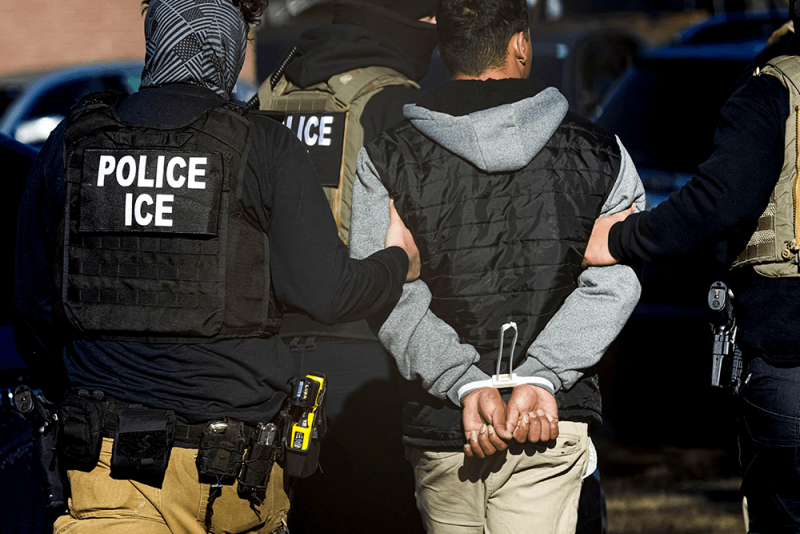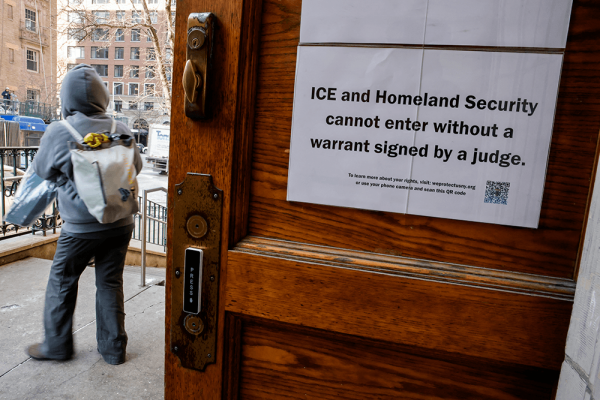Now that President Donald Trump has rescinded longstanding policy limiting U.S. immigration enforcement in churches and other sensitive locations, some church leaders are wondering what they should do if an Immigration and Customs Enforcement officer comes knocking.
In the two weeks since Trump’s announcement, ICE officials have detained at least one immigrant outside a church. Wilson Rogelio Velasquez Cruz had reportedly sought asylum and had a work visa, with no criminal history. Yet the husband and father is now slated to be deported.
“When the Trump administration removed the sensitive-locations authorization, it kind of made me really start getting my gears turning wondering about, how do we ensure that our people know exactly what to do if law enforcement or a government official were to come to our building, particularly during open hours?” Rev. Minna Bothwell told Sojourners.
Bothwell pastors Capitol Hill Lutheran Church in downtown Des Moines, Iowa, a part of the Evangelical Lutheran Church in America. The congregation grew from the merger of two older, immigrant churches, she said. Member experience with immigration goes back to those who fled Germany amid World War II.
“As people of faith,” Bothwell explained, “we are called to provide sanctuary, welcome the stranger, and uphold the dignity of all people — holding both joy and sorrow without discrimination.”
But when she sought out resources for churches seeking how best to respond if ICE or other law enforcement officers pay a visit, she found very little.
Looking for answers
A number of organizations have publicized resources for individuals informing them of their rights. Capitol Hill Lutheran and other churches have distributed the Immigrant Legal Resource Center’s “red cards,” for example, which help people exercise their rights under the Fourth and Fifth Amendments of the Constitution. The ILRC reported “unprecedented demand” for the red cards. Likewise, the National Immigrant Justice Center, based in Chicago, has a two-page reference sheet explaining what to do if someone encounters ICE. The Legal Aid Society in New York and the American Civil Liberties Union have similar fact sheets.
But “there was nothing explicit or concise” to help churches develop policies or train volunteers for a potential encounter with ICE, Bothwell said.
So she undertook days of research and conversations with experts and attorneys to produce just such a resource that she says she’s now eager to share with other congregations.
250206-icerights3.png

“Once I received confirmation that the materials were legally sound, I began sharing them online,” Bothwell said, “recognizing that many faith communities were urgently seeking reliable guidance amid widespread misinformation.”
She pointed to one example, an image describing individuals’ Fourth and Fifth Amendment rights. It also declares “FIGHT,” which “if taken literally in a high-stress situation ... could lead to unintended consequences, making it less effective in ensuring a calm and constructive response,” Bothwell said.
She wanted information that’s not only accurate but also easy to understand, practical, and designed to de-escalate tension.
Recommendations for churches
Other churches in the Des Moines area, including other denominations, have adapted Bothwell’s materials for their own use. She encourages churches to first seek legal counsel before using her materials, but she hopes they will help churches get prepared, educate volunteers and parishioners about their rights, and maintain confidentiality.
The policies now in place at Capitol Hill Lutheran are meant “to ensure that we have done everything in our power, with as much wisdom as we can, to protect the people and the information that they have entrusted to us,” Bothwell said.
Warrants
A major way Trump’s policy recission affects churches, according to the ACLU of Texas, is that “some of these previously sensitive locations would need to start determining, where is a place open to the public.”
Sarah Cruz, border and immigrant rights strategist with the ACLU of Texas, said distinguishing public and private spaces matters because “if ICE does approach a private space, they would need that judicial warrant signed by a judge.”
A valid warrant should have the location, address, and name of the person they are seeking; the word ‘warrant;’ and the judge’s signature, according to Cruz, who delivers “Know Your Rights” webinars for the ACLU of Texas.
Judicial warrants can be confused with administrative warrants, which are signed by an immigration officer rather than a judge and differ in other key ways. NYLPI and the National Immigrant Justice Center provide examples of each, and Bothwell’s material includes a guide to verifying the validity of a warrant. However, her church’s policy is to refuse entry or consent to a search until after they have called an attorney to verify the warrant rather than determining the validity themselves.
Cruz contrasted a church’s private areas, such as offices, prayer rooms, or Sunday school classrooms, with its public areas where anyone may enter, including ICE officials who don’t have a warrant. NYPLI suggests that nonprofits put up signs to mark private areas. The materials Bothwell developed include signage and an example policy that explicitly lists which spaces are considered public and when: The sanctuary, lobby, fellowship hall, certain restrooms, and the parking lot are public spaces for an hour or two during services.
“It’s important that the congregation and the people who are coming to worship understand that that is a public space during those hours,” Bothwell said, “and that anyone can enter into the building.”
Questioning
ICE agents may ask for information, but staff members at nonprofits should first ask if they are free to go, and if not, ask to speak with an attorney or explain they can’t answer questions without talking with their supervisor and a lawyer, according to NYLPI’s guidance to nonprofits regarding immigration enforcement.
Individuals can invoke Fifth Amendment protections to remain silent if asked about their immigration status, said Cruz.
“Regardless of your immigration status or your background, you do have constitutional rights that protect you,” she said. “A person also has the right to ask if ICE has a warrant … if the warrant does not match the location, is not signed by a judge, that person does have the right to say, this is not the correct information for the premises, and they can terminate the interaction at that point.”
Sample protocols that Bothwell developed include several scripts volunteers can use if anyone asks for someone’s location. The scripts generally refer to church policy restricting sharing personal information.
Cruz noted that people who believe their rights are being violated should stay calm and may consider exercising their right to record the interaction.
Harboring
The National Immigration Law Center urges churches to be aware of federal law that makes “harboring” undocumented immigrants a crime if a person knew or should have known an immigrant was in the U.S. without authorization.
What exactly “harboring” means can vary between courts, according to an explainer from the National Immigration Project. General advice about people’s constitutional rights and how people can respond if ICE shows up, or “general announcements about ICE sightings,” shouldn’t run afoul of the law, the NIP explainer notes. But telling someone who you know is undocumented that ICE is at their workplace could be considered a crime, as could providing assistance such as transportation, housing, or employment.
‘Gratitude and relief’
After sharing her materials with other clergy, Bothwell said she was met with “gratitude and a little bit of relief,” as well as some skepticism.
“People did respond with a mix of curiosity and some suspicions, because I’m not a lawyer, obviously,” Bothwell said. She welcomed the chance to explain why developing such policies would protect churches and their parishioners.
Wanting to be prepared stems “not out of fear but really out of faithfulness,” she explained.
“If something were to happen, we would know that we’d done everything possible to protect what was entrusted to us,” she said. “At least for me, there is a little bit of relief in knowing, OK, I kind of know what to do should this situation arise.”
Got something to say about what you're reading? We value your feedback!







